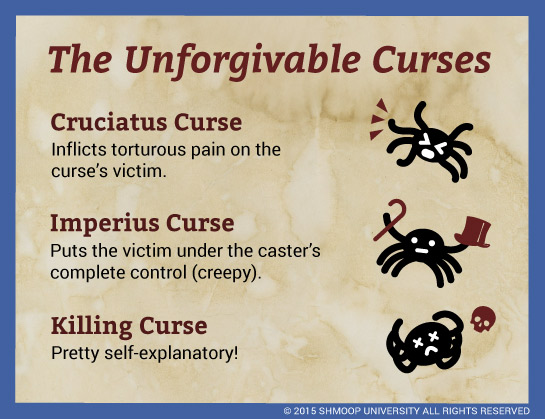
(Click the infographic to download.)
In Harry Potter and the Goblet of Fire, with the introduction of the three Unforgivable Curses – the Cruciatus Curse, the Imperius Curse, and Avada Kedavra – we learn some interesting nuances of wizarding law. It's not only illegal to cause someone torturous pain (Cruciatus) and death (Avada Kedavra); it's also unforgivable to try and dominate someone else's will (Imperius). It's obvious that the Imperius Curse is wrong in the hands of power-hungry maniacs like Voldemort, who uses it to try and make Harry dance to his tune during their wizard duel in Little Hangleton. But there's also a moral problem with Barty Crouch, Sr.'s efforts to control his Death Eater son through the Imperius Curse. Even if Barty Crouch, Sr. thinks he's doing his kid a favor by keeping him under house arrest rather than leaving him in Azkaban Prison, can you imagine the horrible emotional damage it would do to both father and son to have a father exert that kind of daily power over his kid, for years on end? And isn't it part of Barty Crouch, Jr.'s problem in the first place that he feels under his father's thumb all the time? While Barty Crouch, Sr. may have had good intentions, his use of this illegal curse leads to disastrous results. Wanting that kind of power over another person, for whatever reason, is always going to lead you into dark places.
Questions About Power
- Which characters in Goblet of Fire most like to demonstrate their power over other people? Which character traits do these people share? Are they all on the same side of the "good" vs. "evil" divide?
- How does Goblet of Fire depict relations between the wizarding and Muggle worlds? How do wizards keep themselves hidden from Muggles? What are some reasons why wizarding society might want to stay anonymous?
- Goblet of Fire shows us several wizards who seem willing to choose personal power over their families. What traits do these wizards have in common? What reasons might they have for choosing professional success over family happiness?